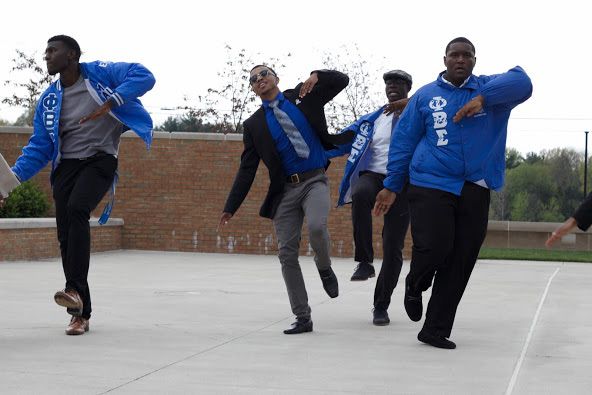A look back — and ahead — at African-American Greek life
February 20, 2019
Correction: The initial story stated there were seven Greek organizations. This story has been corrected to reflect the correct number, which is eight.
There are eight Greek organizations at Kent State that make up the National Pan-Hellenic Council (NPHC), a collaborative organization of nine historically African-American fraternities and sororities often referred to as the “Divine Nine.” As Black History Month continues, these fraternities and sororities think it is important to look back at the history of their organizations.
The eight NPHC-associated fraternities and sororities at Kent State are Alpha Phi Alpha, Kappa Alpha Psi, Omega Psi Phi, Iota Phi Theta, Delta Sigma Theta, Phi Beta Sigma, Sigma Gamma Rho and Zeta Phi Beta.
Where they all began
Alpha Phi Alpha was founded in 1906 at Cornell University.
Kappa Alpha Psi was founded in 1911 at Indiana University Bloomington.
Omega Psi Phi was founded in 1911 at Howard University.
Delta Sigma Theta was founded in 1913 at Howard University.
Phi Beta Sigma was founded in 1914 at Howard University.
Zeta Phi Beta was founded in 1920 at Howard University.
Sigma Gamma Rho was founded in 1922 at Butler University.
Iota Phi Theta was founded in 1963 at Morgan State College.
NPHC was founded in 1930 at Howard University under the mission statement, “Unanimity of thought and action as far as possible in the conduct of Greek letter collegiate fraternities and sororities, and to consider problems of mutual interest to its member organizations.”
Alcedos Vanterpool, the president of Kent’s Phi Beta Sigma’s Epsilon Epsilon chapter and a junior educational studies major, stressed the importance of African-American fraternities and sororities on campus.
“I know that African-American students for our organizations don’t make up the majority, so being able to have that representation on campus in Greek life is an enriching part of fraternity and sorority life here,” Vanterpool said. “I think we bring a perspective that not too many IFC (Inter-Fraternity Council) and Pan-Hel (Panhellenic) organizations can really bring in that we include culture into the basis of what we do.”
Phi Beta Sigma was founded in 1914 at Howard University by A. Langston Taylor, Leonard F. Morse and Charles I. Brown as a service fraternity with the motto, “Culture for Service and Service for Humanity.” Vanterpool said he hopes his brothers are able to live up to that motto and the pillars of brotherhood, scholarship and service.
“We’re doing a lot of community service, so we participate in Super Service Saturdays,” Vanterpool said. “We do a lot of work with the King Kennedy Center in Ravenna. Occasionally, we’ll go up to Cleveland and do some work up there with our graduate chapter.”
Phi Beta Sigma also does fundraising for its philanthropy, March of Dimes, in May.
Notable members of Phi Beta Sigma include Kwame Nkrumah, the first president of the Republic of Ghana, Representative John Lewis of Georgia and Kent State Dean of Students Lamar Hylton.
In the coming years, Vanterpool hopes to see the fraternity continue to grow and be more active in the community. He also wants to incorporate topics like masculinity in the black community and sexual assault awareness into the fraternity’s programming in the future.
“I think when people look at black Greek letter organizations, they tend to think more of the flashy parts of Greek life for us like strolling and stepping, and there is a whole lot more,” he said. “I think in the future you’ll see a bigger emphasis of academics, definitely a bigger emphasis on community service and actually playing more active roles in our community, because at the end of the day, our founders founded our organization to be pillars in our community.”
Junior sociology major Royce Johnson echoed these hopes. As a brother in Alpha Phi Alpha, Johnson wants to see his chapter become more involved with the community.
“Taking leadership roles around campus will help us step up and really be a voice for our students on campus,” Johnson said.
Johnson would also like to see his chapter grow in number on campus, and see the fraternity expand to more universities and different countries. “We’re trying to work with administration, work with our leaders, work with the dean of students to help create the vision of what Kent students have for their college experience. I think growing in numbers and taking more leadership roles and continuing giving back and providing services for our community will help us make a bigger impact,” he said.
Alpha Phi Alpha was founded in 1906 at Cornell University during a time when many African-Americans across the country faced significant prejudice, including being unable to join fraternities, Johnson said. Johnson mentioned several notable brothers of Alpha Phi Alpha, including Dr. Martin Luther King Jr., W.E.B. DuBois, Jesse Owens and Oscar Ritchie, who has a hall on campus bearing his name.
David Williams is a senior reporter. Contact him at [email protected].

























